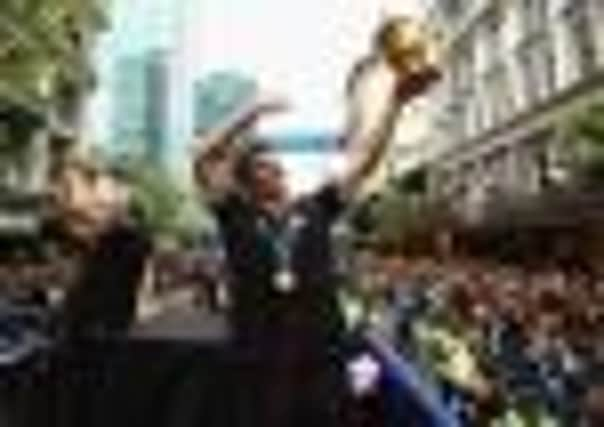Outpouring of delight as New Zealand hails heroes


New Zealand had not won the Webb Ellis trophy since the inaugural tournament in 1987 and were forced to dig deep in Sunday’s final as they rode a wave of emotion across the rugby-mad country to scratch out a nail-biting 8-7 victory at a packed Eden Park.
With Monday a public holiday in New Zealand, the collective hangover of the country’s largest city was still palpable on the streets as thousands of people gathered early for the victors parade, mixing with stragglers making their way home from late-night festivities.
Advertisement
Hide AdAdvertisement
Hide AdCrowds were banked 20-deep in places along the parade’s route in central Auckland as the procession kicked off at 2.30pm local time, with players, coaches and support staff ferried along city streets in a convoy of open-deck utility vehicles.
“This is very special. I can’t believe how many people are out here. This is just awesome,” said All Blacks stand-off Dan Carter, whose tournament finished early with a torn groin tendon, riding in the first car.
Yesterday’s joyous outpouring, the largest in the country since Team New Zealand’s ‘Black Magic’ won yachting’s greatest prize for the first time with their 1995 America’s Cup triumph, was carried by both national television networks and left the players amazed by the turn-out.
“It’s a great day. It’s so fantastic. Just shows how much it means to everyone in New Zealand and it’s great to be part of it,” said scrum-half Andy Ellis, who kicked the ball into touch to end Sunday’s final and a generation of frustration.
Captain Richie McCaw and coach Graham Henry paraded the Webb Ellis trophy in the final car, with veterans Brad Thorn and Mils Muliaina and assistant coach Wayne Smith, all of whom ended their All Blacks careers at the tournament.
The team will be feted in further parades this week. New Zealand’s second largest city of Christchurch, which lost the right to host seven World Cup games after a devastating earthquake in February, will hail them on Tuesday before they head to Wellington the following day.
Praise has been lavished on the staging of a tournament, which united an increasingly multi-cultural nation and which and also gone some small way to help heal the wounds of the earthquake. Head of world rugby Bernard Lapasset had one word for the 2011 World Cup: “Extraordinary.”
The Frenchman thanked the organisers, the volunteers, the fans and ordinary New Zealanders up and down a country of little more than four million people. “This World Cup has served to remind us how much New Zealand has brought to world rugby,” said IRB president Lapasset. “And it has shown New Zealand’s strength and its capacity to organise such an international event. You have heritage, you have culture in New Zealand – tradition. And we saw throughout the importance of the Maori culture and integration.”
Advertisement
Hide AdAdvertisement
Hide AdFormer England captain and IRB vice-chairman Bill Beaumont was overwhelmed by the warm welcome visitors had enjoyed.
“You only have to wander around to see the excitement and how this country has embraced Rugby World Cup 2011,” he said. “Everyone who has come to New Zealand, from the big wigs to the fans, have been treated specially.”
International Olympic Committee president Jacques Rogge, himself a former rugby international for Belgium, found the reception to the event to be “excellent”. He added: “What I could hear and see from fans around the world – well, it was fabulous,” he said.
“I think it will do a lot of good for rugby and a lot of good for New Zealand in general.”
Lapasset said that the spirit of the event had boosted the sport. “I want to thank everybody, the New Zealand government, the New Zealand rugby federation and the tournament organisers. Not just them, but also all the cities, the regions, and not forgetting Christchurch.”
Christchurch was stripped of its matches after a deadly 6.3 magnitude earthquake in February. Damage was extensive following a 7.1 earthquake almost six months earlier and parts of the city were levelled.
The quarter-finals were moved to Eden Park in Auckland, while the five other matches New Zealand’s second city had been scheduled to host were relocated to other venues around the country. “Christchurch is part of this World Cup, part of its history,” Lapasset said.
“We had to make a difficult decision. It was heartbreaking. But the success of this tournament has illustrated the strength of New Zealand.
“The bar has been set very high for future World Cups.”